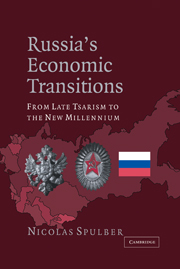Book contents
- Frontmatter
- Contents
- Figures and Tables
- Preface
- PART I THE TSARIST ECONOMIC TRANSITION
- PART II THE SOVIET ECONOMIC TRANSITION
- PART III THE POST-SOVIET ECONOMIC TRANSITION
- 19 The Socioeconomic Framework
- 20 The Transition Issues
- 21 The Economic Policies
- 22 The Problems of Agriculture
- 23 The Industrial Changes
- 24 Domestic and Foreign Trade
- 25 Money and Banking
- 26 State Finance
- 27 Overall View
- Index
27 - Overall View
Published online by Cambridge University Press: 03 December 2009
- Frontmatter
- Contents
- Figures and Tables
- Preface
- PART I THE TSARIST ECONOMIC TRANSITION
- PART II THE SOVIET ECONOMIC TRANSITION
- PART III THE POST-SOVIET ECONOMIC TRANSITION
- 19 The Socioeconomic Framework
- 20 The Transition Issues
- 21 The Economic Policies
- 22 The Problems of Agriculture
- 23 The Industrial Changes
- 24 Domestic and Foreign Trade
- 25 Money and Banking
- 26 State Finance
- 27 Overall View
- Index
Summary
Transition and the Agricultural Economy
Consider now the similarities and the differences among the three transitions toward modernization in general, the structural transformations they called forth, the changes they set in motion within the different frameworks in which they arose, and the conceptions advanced during their unfolding by the reformers who proposed the measures. In the pursuit of the same goal, namely “catching up” with the continually developing countries of Western Europe, the three Russian transitions toward modernity called forth many valid proposals and set in motion methods of changes; yet all ultimately yielded only limited results. Poor and underdeveloped Tsarist Russia aimed quite decisively from the 1890s on to surmount its backwardness, notably by supporting the expansion of some of Russia's industries oriented toward export, and forcefully developing Russia's railway network with substantial help from foreign capital. Yet, the succeeding Soviet Russia still inherited a backward, war-ravaged economy that in its turn tried to develop by emphasizing from 1928 on the rapid growth of heavy industry (oriented primarily toward military production), deliberately neglecting the civilian needs, and rejecting the import of foreign capital. After all this, however, Soviet Russia also failed to “catch up” and, as its leaders had pretentiously sought, to “surpass” the West. Finally, the patrimonial state of Boris Yeltsin and then of Vladimir Putin inherited the largely obsolescent Soviet industry within the limits of a former empire shattered in all its structural components.
- Type
- Chapter
- Information
- Russia's Economic TransitionsFrom Late Tsarism to the New Millennium, pp. 387 - 404Publisher: Cambridge University PressPrint publication year: 2003



